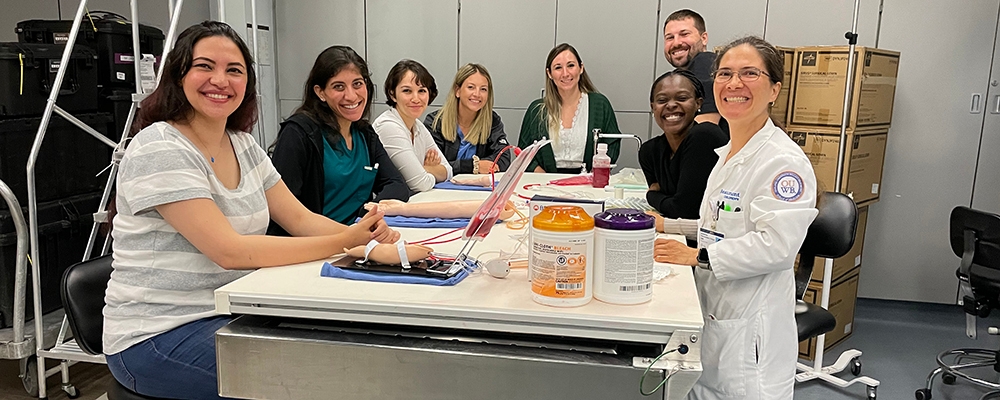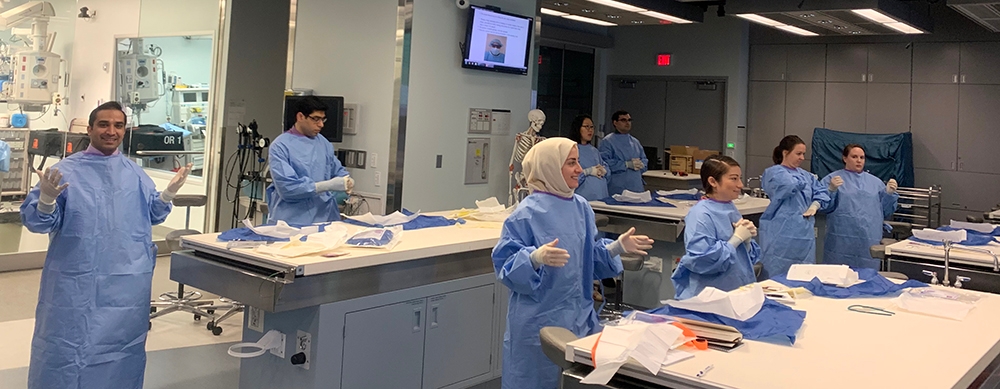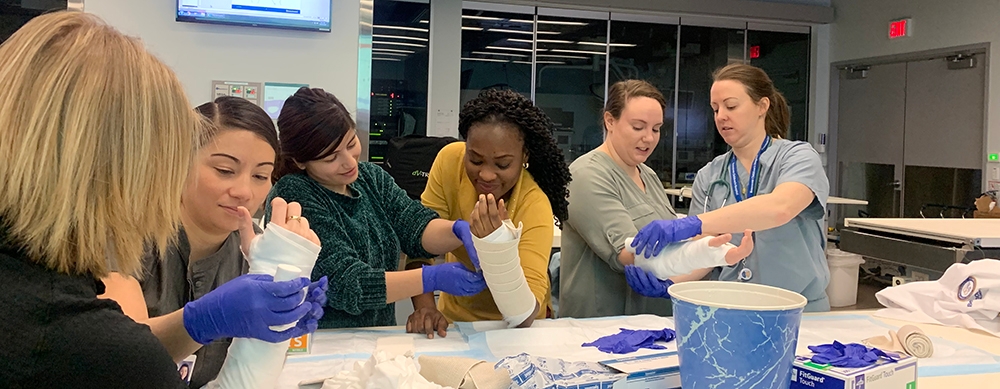Curriculum

The pediatric residency program curriculum provides residents with in-depth clinical experience in Pediatrics and its subspecialties. It fully meets the ACGME program requirements for graduate medical education in pediatrics, with an excellent balance between ambulatory and inpatient components, as well as primary care and tertiary care components. The program provides outstanding didactic activities designed to enhance the assimilation of medical knowledge to prepare residents to become superb, board-certified pediatricians.
Pediatrics yearly rotation schedule
| Rotation | PGY - 1 | PGY - 2 | PGY - 3 |
|---|---|---|---|
Acute Care Clinic | 1 month | 1 month | |
Adolescent Medicine | 1 month |
| |
Ambulatory Community Pediatrics | 1 month |
|
|
Behavioral/Development | 1 month | ||
Emergency Pediatrics | 1 month | 1 month | |
Hematology/Oncology | 1 month |
|
|
Individual Curriculum/Elective | 3 months, 1 RRC List 1 or List 2 Subspecialty | 4 months, 1 RRC List 1 or List 2 Subspecialty | |
Inpatient Ward | 3 months | 2 months | 2 months |
Intern Immersion (1 Floor, 1 Acute Care Clinic) | 1 month |
| |
Mental Health/Community Advocacy |
| 1 month | |
Newborn | 1 month | ||
NICU | 1 month | 1 month | 1 month |
PICU | 1 month | 1 month | |
Research |
| 1 month | |
RRC List 1 or List 2 Sub-specialty | 1 month |
| Rotation | PGY - 1 | PGY - 2 | PGY - 3 |
|---|---|---|---|
Acute Care Clinic | 1 month | 1 month | |
Adolescent Medicine | 1 month |
| |
Ambulatory Community Pediatrics | 1 month |
|
|
Behavioral/Development | 1 month | ||
Emergency Pediatrics | 1 month | 1 month | |
Hematology/Oncology | 1 month |
|
|
Individual Curriculum/Elective | 3 months, 1 RRC List 1 or List 2 Subspecialty | 4 months, 1 RRC List 1 or List 2 Subspecialty | |
Inpatient Ward | 3 months | 2 months | 2 months |
Intern Immersion (1 Floor, 1 Acute Care Clinic) | 1 month |
| |
Mental Health/Community Advocacy |
| 1 month | |
Newborn | 1 month | ||
NICU | 1 month | 1 month | 1 month |
PICU | 1 month | 1 month | |
Research |
| 1 month | |
RRC List 1 or List 2 Sub-specialty | 1 month |
SUB-SPECIALTY - Residents take at least seven months of subspecialty rotations. At least four of the subspecialty months will be taken.
Within the seven subspecialty months, each resident must complete a minimum of four different one-month block rotations from the following list of pediatric subspecialties.
List 1
- Child abuse
- Medical genetics
- Pediatric allergy/immunology
- Pediatric cardiology
- Pediatric dermatology
- Pediatric endocrinology
- Pediatric gastroenterology
- Pediatric hematology-oncology
- Pediatric infectious diseases
- Pediatric nephrology
- Pediatric neurology
- Pediatric pulmonary
- Pediatric rheumatology
The additional three months may consist of subspecialties from List 1, List 2, or combinations of subspecialties.
List 2
- Child and adolescent psychiatry
- Hospice and palliative medicine
- Neurodevelopmental disabilities
- Pediatric anesthesiology
- Pediatric dentistry
- Pediatric ophthalmology
- Pediatric orthopedic surgery
- Pediatric otolaryngology
- Pediatric rehabilitation medicine
- Pediatric radiology
- Pediatric surgery
- Sleep medicine
- Sports medicine
Individualized curriculum / elective rotations
The pediatric residency program provides residents with six educational units (months) of individualized curriculum. The individual curriculum is determined by the learning needs and career plans of each resident and developed through the guidance of the resident’s faculty advisor. These months may include additional subspecialty rotations, as well office rotations, research months, hospital medicine, healthcare disparities, global health, fellow-level NICU, and many others.
- Robust quality improvement curriculum
- “Your Role in Promoting Patient Safety,” “Corewell Health QI: Introduction to Quality Behaviors,” and “Safe Transitions of Care” courses provided during orientation
- Kaizen – a cutting edge program which provides two full days of intensive, hands-on quality improvement scheduled during intern year
- Group quality improvement projects with mentorship from faculty
- Opportunities to participate in hospital-wide quality committees
- Longitudinal ambulatory health care disparities and quality improvement activities
- Regional and national quality improvement initiatives (through AAP, APA, NIPIN)
- Innovative pediatric advocacy
- Community health and advocacy rotation affords residents the opportunity to work directly with community agencies
- MIAPP pediatric advocacy elective
- Resident representatives attend Pediatric Advocacy Day and GME Advocacy Day in Lansing
- Active resident involvement in the AAP resident section
Didactics
Academic half day
Thursday: 1 - 4 pm
Academic half day is a protected time on Thursday afternoons for resident education. A wide variety of speakers from multiple pediatric subspecialties review and discuss current concepts based on the American Board of Pediatrics educational content. Academic half day implements a 12-month rotating curriculum organized by systems and specialties. Other topics covered include: board review series, journal club, global health curriculum, keystones of development curriculum, palliative care, financial planning, how to find a job sessions, quality improvement series, acute care and emergencies education series, professionalism and ethics conferences, etc.
Also incorporated in our AHD are case conferences. This dynamic conference, which promotes interaction between our residents and invited faculty, provides an in-depth discussion of a variety of fundamental and rare, interesting cases. An evidence-based approach with Socratic teaching is used to enhance the development of our residents’ critical thinking and clinical reasoning skills.
Our quality improvement series teaches residents how to assess and improve the quality and processes of patient care. Residents learn from specific instances like near misses, serious safety events, and any other situations in which quality of care was or could have been compromised.
Medical jeopardy is a fun and interactive way of learning, always a favorite. Jeopardy categories cover the educational content of the American Board of Pediatrics and also incorporate topics such as medical history and facts about faculty and resident colleagues.
Simulation sessions is a procedural skills curriculum taught by a multidisciplinary team of instructors in the Applebaum Simulation Learning Institute at Corewell Health William Beaumont University Hospital . The educational series is led by our pediatric simulation director who is a certified healthcare simulation educator. It provides instruction to residents in the performance of procedural skills that the ACGME and the ABP consider essential for a general pediatrician, as well as mock codes which teach our residents how to approach and manage a critically ill child, communication skills and teamwork.
Grand Rounds
Tuesday: 8 - 9 am
This traditional grand rounds encompass a wide variety of pediatric topics by local, regional, and national experts.



